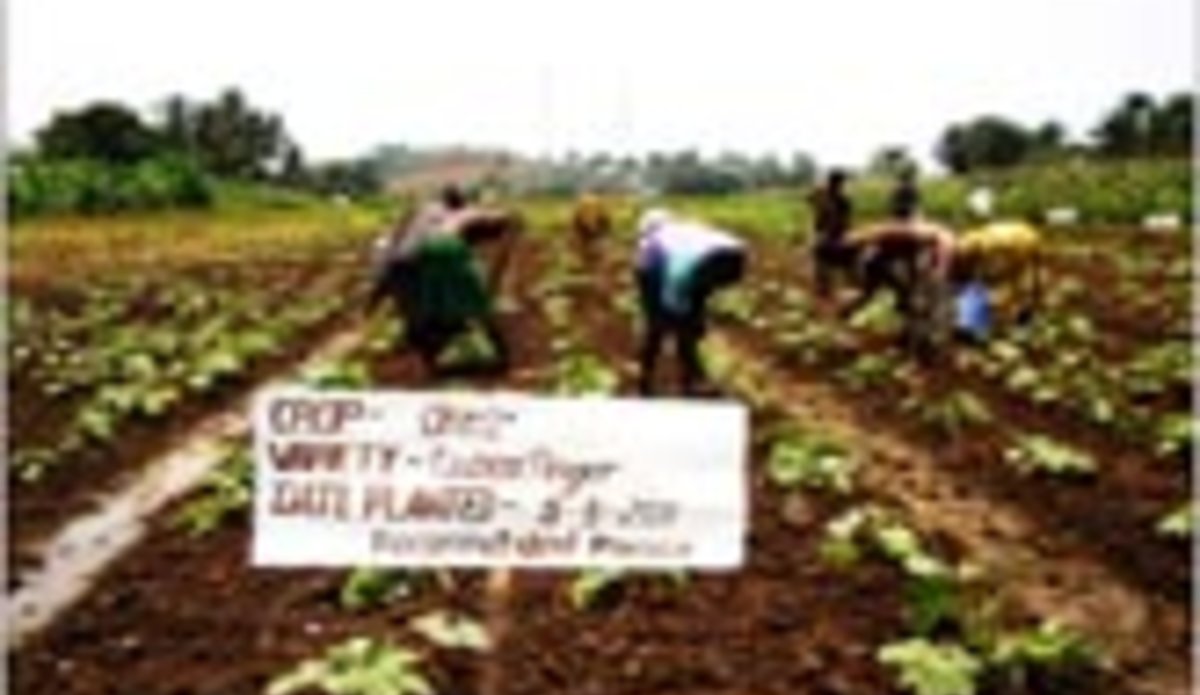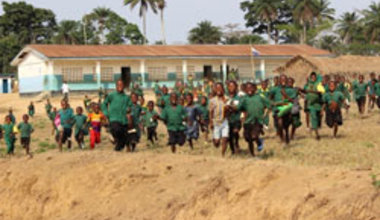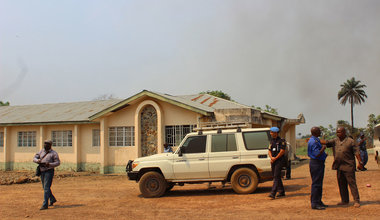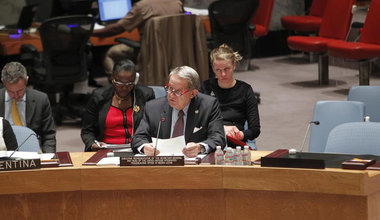Harvesting The Fruits of Knowledege in Rural Sierra Leone
Potentially, Sierra Leone could be much more agriculturally productive, due to its bountiful natural resources and plentiful water supply. Lack of expertise, poor infrastructure and low technological input are all inhibiting expansion in this sector, though. This feature story describes how, through a jointly-supported programme, FAO, ILO and UNIDO are helping by training farmers in the country's four regions in better agricultural practices and agribusiness.
"We have all gained so much...We help each other improve our businesses...The future looks bright."
Mamie Jimmy, farmer
In a lush green glade, about a kilometre south of Sierra Leone's second city, Bo, a group of 25 farmers gathers for their weekly meeting. They are engaged in the FAO-financed Farmer Field Schools project. Every Saturday they meet here to learn, through theoretical and practical training, how to improve farming skills. The training begins with sowing the crops and ends four months later at harvest time.
An obvious difference in productivity
Each group is allocated two plots: one which they farm in the traditional way and one where they must follow the recommended practice, using fertilisers and different farming techniques. "The difference in productivity quickly becomes obvious," says Richard Allieu, the District Coordinator, as he visits to monitor the plots in the project's third month. He explains, "Now we'll discuss the reasons for the difference, what we can do about pests and how best to maximize output. The knowledge they get at the field schools will subsequently be applied to their own land."
Tools and skills are key
Convinced of the gains to be made from working collectively, Pastor Mikael Sandi, brought the group together and in June 2010, with the support of FAO, access was granted to the training plot. The plot has made a vast difference. "Life is better; before this time we used to suffer a lot," says Sandi, stressing the importance of farmers being given the tools and skills to increase their overall productivity. "We have all used the knowledge from the Farmer Field Schools course on our individual farms," he confirms. "The team is very committed. We want to operate on a large scale, providing for our region - our dream is even to export," he says.
Better processing and marketing means more profit
Across Sierra Leone FAO also supports Agriculture and Business Centres. An integral part of helping farmers process and market their crops for a better profit, the Agriculture and Business Centres are open to anyone in the area. They are built collaboratively by the farmers' groups and set up near the Farmer Field Schools, offering a mill for grinding the cereals and an area for drying grain crops. "We used to do all this work with our hands," says Mamie Jimmy, 45, lifting her basket of rice to pour into the funnel of the mill at the Agriculture and Business Centres at Kenema. A tall, proud-looking woman, Mamie Jimmy is one of 40 farmers busy there. "What is now done in a few hours, used to take a week," she says, raising her voice against the din of the engine. She explains her situation, "It has been very difficult; I'm alone caring for my three daughters and my elderly mother." Six more children became her responsibility two years ago when her sister and brother in law died. She says "I could not provide all the children with food and schooling. They had to work on the farm and sell vegetables on the street." Even the youngest were allotted tasks: they were in the fields, acting as scarecrows to keep the birds from eating the crops
Keeping half the harvest for the family
Last year, after registering with her local Farmers' Association, Mamie Jimmy joined the Agricultural Business Organisation, linked with the Agriculture and Business Centres. Things began to look up. As part of a 15 person group, seven of them women, she received two plots of land in Kenema. "Now we have a drying floor and FAO provides us rice seed. I am able to pay for both my daughters' and my sisters' children´s school fees. They no longer have to work for me," she says, her face lighting up in a smile. Helped by the Agriculture and Business Centres, she now keeps half of her harvest for the family and sells the rest. "We have gained so much from the Agricultural Centre and the training at the Field School," says Mamie. "This has become the meeting point in the community and we now help each other improve our businesses. The future looks bright," she adds. Agriculture and Business Centres and Farmer Field Schools are being built all over Sierra Leone, providing farmers with the tools and skills they need to push themselves out of poverty.
.....................................................................................................
Photo: Therese Leijon - Using fertilisers and different farming techniques, the trainees at Farmer Field Schools
work the demonstration plots and discover the remarkable increases in productivity that come from applying their improved skills.
Text: Therese Leijon
 UN
UN





